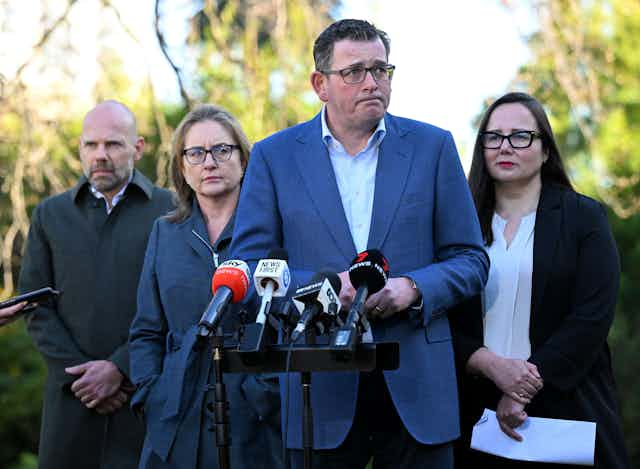A Victorian Morgan SMS poll, conducted July 19–20 – the two days after Victorian Premier Daniel Andrews announced the 2026 Commonwealth Games would be cancelled – gave Labor a 53–47% lead over the Coalition, a huge 8.5-point gain for the Coalition since a May Morgan poll. The sample size was 1,046 people.
Primary votes were 35.5% Coalition (up seven since May), 33% Labor (down nine), 12.5% Greens (steady), 10.5% independents (up 1.5) and 8.5% others (up 0.5). Support for independents is likely to be overstated as not all seats will attract viable independents at an election.
In a forced choice, voters disapproved of Andrews by 55–45% (compared to a 52.5% approval in May). This is the first time since becoming premier after the 2014 state election that Andrews has had a higher disapproval than approval rating in Morgan polls. Andrews led Liberal leader John Pesutto as better premier by 52.5–47.5%, a drastic reduction from his 64–36% lead in May.
By 58–42%, voters also supported the cancellation of the games. However, the 58% who supported this would have included voters who thought the government should never have offered to hold the games in the first place.
The plunge for Labor in this poll is likely due to the public perception the government has been incompetent in its handling of the games ordeal.
Labor maintains huge lead in national Resolve poll
In this week’s federal Resolve poll for Nine newspapers, conducted July 12–15 from a sample of 1,610 people, Labor had 39% of the primary vote (down one since June), the Coalition 30% (steady), the Greens 11% (down one), One Nation 6% (steady), the UAP 1% (down one), independents 9% (up one) and others 2% (steady).
Resolve does not publish a two-party estimate until close to elections, but an estimate based on 2022 preference flows gives Labor about a 58.5–41.5% lead over the Coalition, a 0.5-point gain for the Coalition since June. Resolve’s polls have been much better for Labor than others since the 2022 election.
Prime Minister Anthony Albanese’s ratings were 51% good (down two points) and 35% poor (steady), for a net approval of +16, down two points.
Opposition leader Peter Dutton’s net approval improved five points to -15. Albanese led Dutton as preferred PM by 51–21% (compared to 53–22% in June).
On economic management, Labor led the Liberals by 35–31%, little changed from a 34–31% Labor lead in June. On keeping the cost of living low, Labor led by 31–24%, an increase from a 27–23% Labor lead in June.
By 51–37%, voters also agreed if they had a major expense of a few thousand dollars, they would struggle to afford it (46–41% disagreed with this premise in February).
Just 5% thought the economy would improve in the next month, though support was higher with longer time periods (28% for next year, 41% for next five years).
The survey respondents were told permanent migration into Australia was about 160,000 per year before COVID, but fell to negligible levels in 2020-21, and that to make up for this, immigration is likely to reach 350,000–400,000 this year before falling to 320,000 next year.
On these new levels of immigration, 59% thought them to be too high, 25% said they were about right and just 3% too low. By 38–34%, voters supported increasing the minimum wage for temporary skilled visa holders from $53,900 to $70,000 a year.
Federal Labor maintains lead in Morgan poll
In this week’s Morgan weekly federal poll, conducted July 10–16 from a sample of 1,401 people, Labor led the Coalition by 53–47%, a 1.5-point gain for the Coalition since the previous week. This is the second successive 1.5-point gain for the Coalition in this poll.
Primary votes were 35.5% Labor, 35% Coalition, 12.5% Greens and 17% for all others. Analyst Kevin Bonham said Morgan’s respondent allocated preferences were unusually bad for Labor this week.
Fadden byelection near-final result
With nearly all votes counted in last Saturday’s federal byelection for the Queensland seat of Fadden, the Liberal National Party defeated Labor by 63.4–36.6%, a 2.8% swing to the LNP since the 2022 election.
Primary votes were 49.1% LNP (up 4.5%), 22.0% Labor (down 0.3%), 8.9% One Nation (up 0.2%), 7.3% Legalise Cannabis (new) and 6.2% Greens (down 4.6%). Turnout is currently 71.5%.
NSW Resolve poll: Labor holds big lead, but down since May
A New South Wales state Resolve poll for The Sydney Morning Herald, conducted with the federal June and July Resolve polls, gave Labor 41% of the primary vote (down three since May), the Coalition 32% (up one), the Greens 10% (up one), independents 11% (up one) and others 5% (steady).
Bonham estimated a Labor two-party lead of 58.5–41.5% from these primary votes. Labor Premier Chris Minns led the Liberals’ Mark Speakman by 39–12% as preferred premier (compared to 42–12% in May).
Respondents in the poll were told the Independent Commission Against Corruption had found “serious corrupt conduct” concerning former Liberal Premier Gladys Berejiklian’s romantic relationship with a former MP.
However, by 51–25%, voters agreed they still liked and respected Berejiklian. By 40–34%, they agreed Berejiklian should not have resigned as premier based on the ICAC report.

